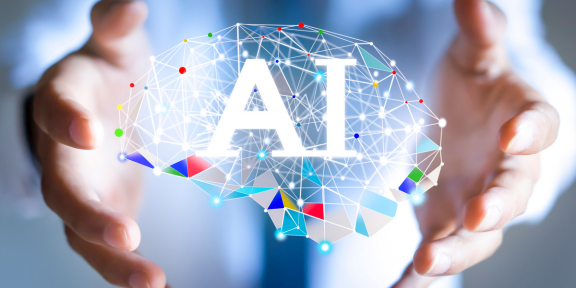AI in Business a New Revolution

Artificial Intelligence (AI) is transforming the way businesses operate across all sectors. From automating repetitive tasks to providing personalized customer experiences, AI has become an indispensable tool for businesses of all sizes. In this comprehensive guide, we will explore the benefits of AI in business, AI technologies, implementation challenges, and the future of AI in business.
AI, also known as machine intelligence, is the simulation of human intelligence processes by machines. AI has become a crucial technology in the business world, helping companies to streamline their operations, increase efficiency, and improve accuracy. The use of AI technology in business is rapidly growing, and it is estimated that the global AI market will reach $267 billion by 2027.
Benefits of AI in Business
The benefits of AI in business are numerous. One of the most significant benefits is its ability to automate routine and repetitive tasks, freeing up employees to focus on more complex tasks. AI can also help businesses to make more informed decisions. By analyzing data from various sources, AI can identify patterns and make predictions that can help businesses to optimize their operations and increase revenue.
Another benefit of AI in business is its ability to improve customer experience. AI-powered chatbots can provide 24/7 customer support, answering common questions and resolving issues quickly. AI can also provide personalized recommendations and offers, increasing customer loyalty and retention.

AI for Business Statistics
The adoption of AI in business is rapidly growing, and the statistics prove it. According to a survey conducted by PwC, 72% of business leaders believe that AI is going to be a significant business advantage in the future. Another study by Gartner predicts that by 2022, 70% of customer interactions will involve AI-powered chatbots.
In addition, AI is projected to create $2.9 trillion of business value and generate 6.2 billion hours of worker productivity by 2021. The use of AI in business is a trend that is here to stay.
AI Technologies in Business
There are several AI technologies that are being used in business today. One of the most popular is machine learning, which uses algorithms to analyze data and make predictions. Natural Language Processing (NLP) is another AI technology that is used to help machines understand and interpret human language.
Robotics and automation are also being used in business to streamline operations and reduce costs. Autonomous vehicles and drones are being used for transportation and delivery, while warehouse robots are being used for tasks such as inventory management and order fulfillment.

How to Implement AI in Business
Implementing AI in business can be a complex process, but there are several steps that companies can take to ensure success. The first step is to identify the business problem that AI can solve. Once the problem has been identified, it is important to collect and prepare the data needed to train the AI model.
Next, companies need to select the appropriate AI technology and build the AI model. The AI model should then be tested and evaluated to ensure that it is accurate and effective. Finally, the AI model should be integrated into the company’s existing systems and processes.
AI Adoption Challenges in Business
While the benefits of AI in business are clear, there are also several challenges to adoption. One of the biggest challenges is the lack of understanding and expertise in AI technology. Many companies lack the necessary skills and knowledge to implement and manage AI systems effectively.
Another challenge is the cost of implementing AI systems. Building and maintaining AI models can be expensive, and many companies may not have the budget to invest in AI technology. In addition, there are concerns about the impact of AI on jobs, which can create resistance to adoption.
AI Applications in Business
AI technology is being used across a wide variety of industries, from healthcare to finance to retail. In healthcare, AI is being used to diagnose diseases and develop personalized treatment plans. For finance, AI is being used for fraud detection and risk management. With retail, AI is being used to provide personalized recommendations and improve the customer experience.
AI Examples in Business
One example of AI in business is Amazon’s recommendation engine, which uses machine learning algorithms to provide personalized product recommendations to customers. Another example is IBM’s Watson, which is being used in healthcare to analyze patient data and develop treatment plans.
In the finance industry, Capital One is using AI to detect fraud and prevent money laundering. In manufacturing, General Electric is using AI-powered robots to inspect and maintain their equipment, reducing downtime and increasing efficiency.
AI Tools and Platforms for Business
There are several AI tools and platforms that businesses can use to implement AI technology. Some popular AI tools include TensorFlow, Keras, and PyTorch, which are open-source machine learning libraries.
Cloud-based AI platforms such as Amazon Web Services (AWS) and Microsoft Azure provide businesses with access to AI tools and services without the need for costly infrastructure investments.
AI for Small Businesses
AI technology is not just for large corporations. Small businesses can also benefit from AI, especially in areas such as customer service and marketing. Chatbots can provide 24/7 customer support, while AI-powered marketing tools can help businesses to target their audience more effectively.
AI and Customer Service
AI-powered chatbots are becoming increasingly popular in customer service. Chatbots can provide quick and accurate responses to common questions, freeing up customer service representatives to handle more complex issues. AI-powered chatbots can also provide personalized recommendations based on customer data, improving the overall customer experience.
AI and Marketing
AI is transforming the way businesses approach marketing. AI-powered marketing tools can analyze customer data and provide insights that help businesses to target their audience more effectively. Personalize marketing messages and offers, increasing customer engagement and loyalty is another benefit of AI.
AI and Sales
AI is being used to improve sales performance. AI-powered sales tools can analyze customer data to identify patterns and predict buying behavior. This information can then be used to develop targeted sales strategies that improve conversion rates and increase revenue.
AI and HR
AI is being used in HR to streamline recruiting and hiring processes. AI-powered tools can analyze resumes and job applications to identify the best candidates for a position. AI can also be used to automate routine HR tasks, such as scheduling interviews and onboarding new employees.
AI and Finance
Transforming the finance industry, providing new opportunities for fraud detection and risk management is another way AI is being used. AI-powered tools can analyze financial data to identify suspicious activity and prevent fraud. Artificial Intelligence can also be used to develop predictive models that help businesses to manage risk and make more informed investment decisions.
AI and Supply Chain Management
AI technology is being used to improve supply chain management. AI-powered tools can analyze data from various sources to identify inefficiencies and optimize logistics. This can result in reduced costs and improved delivery times.
AI and Cybersecurity
AI is also being used to improve cybersecurity. AI-powered tools can detect and prevent cyber threats by analyzing large amounts of data and identifying patterns that may indicate an attack. Artificial Intelligence can also be used to develop predictive models that help businesses to anticipate and prevent cyber attacks.
AI and Data Analytics
AI is transforming the field of data analytics. AI-powered tools can analyze large amounts of data to identify patterns and trends that may be missed by human analysts. This can help businesses to make more informed decisions and improve their operations.
AI and Business Intelligence
AI can improve business intelligence. AI-powered tools can analyze data from various sources to provide insights that help businesses to make better decisions. This can include identifying areas for cost savings, predicting customer behavior, and optimizing operations.
Future of AI in Business
The future of AI in business is bright. AI technology is expected to continue to grow and evolve, providing new opportunities for businesses of all sizes. The use of AI is expected to become even more widespread, with more businesses adopting AI-powered tools and platforms.
AI Ethics in Business
As the use of AI in business grows, so do concerns about AI ethics. It is important for businesses to consider the ethical implications of AI, including issues such as bias, privacy, and transparency. Companies should develop policies and guidelines for the ethical use of AI technology.
Wrap Up
AI is transforming the way businesses operate, providing new opportunities for efficiency, accuracy, and customer experience. While there are challenges to adoption, the benefits of AI in business are clear. As AI technology continues to evolve, it is important for businesses to stay up-to-date on the latest trends and developments in order to remain competitive in their respective industries.

Frequently Asked Questions
Q: How could AI be used in business?
A: AI is used in various ways to enhance business operations. Some common applications include:
– Automating repetitive tasks and workflows
– Improving customer service through chatbots and virtual assistants
– Analyzing large datasets for insights and decision-making
– Personalizing marketing and advertising campaigns
– Optimizing supply chain management and logistics
– Enhancing cybersecurity and fraud detection
– Predicting market trends and optimizing pricing strategies
Q: What is an example of AI used in business?
A: One example of AI used in business is recommendation systems. Companies like Amazon and Netflix use AI algorithms to analyze user behavior and preferences, and then provide personalized recommendations for products or content. This helps improve the customer experience, increase sales, and drive customer satisfaction.
Q: How is AI used in small businesses?
A: Small businesses can leverage AI in various ways, including:
– Streamlining administrative tasks such as data entry and document processing
– Automating customer support through chatbots or virtual assistants
– Analyzing customer data to identify patterns and preferences for targeted marketing
– Optimizing inventory management and demand forecasting
– Automating repetitive tasks to free up time for more strategic activities
Q: How Does Artificial Intelligence Help Business?
A: Businesses can benefit from AI in several ways, including:
– Increased operational efficiency and productivity
– Improved customer experience and satisfaction
– Enhanced decision-making through data-driven insights
– Cost savings through automation and process optimization
– Competitive advantage through personalized and targeted marketing
– Enhanced cybersecurity and fraud prevention measures
– Predictive analytics for proactive business strategies
Q: Which industry will benefit most from AI?
A: While AI can benefit various industries, some industries that are likely to see significant impact include:
– Healthcare: AI can assist in medical diagnosis, drug discovery, and patient monitoring.
– Finance: AI is used for fraud detection, risk assessment, and algorithmic trading.
– Retail: AI can optimize inventory management, personalize recommendations, and automate customer support.
– Manufacturing: AI can improve quality control, predictive maintenance, and supply chain management.
– Transportation: AI can enhance autonomous vehicles, traffic optimization, and logistics planning.
Q: What are the challenges of implementing AI in business?
A: Implementing AI in business may involve challenges such as:
– Data quality and availability: AI relies on large, clean, and relevant data for training and accurate predictions.
– Skill gaps and talent shortage: There is a demand for AI expertise, and businesses may face challenges in finding skilled professionals.
– Ethical considerations: AI raises ethical concerns related to privacy, bias, and job displacement, requiring careful considerations and regulations.
– Integration and scalability: Integrating AI systems with existing infrastructure and ensuring scalability can be complex and time-consuming.
– Cost and ROI: Implementing AI solutions may require significant investments, and businesses need to evaluate the return on investment.
